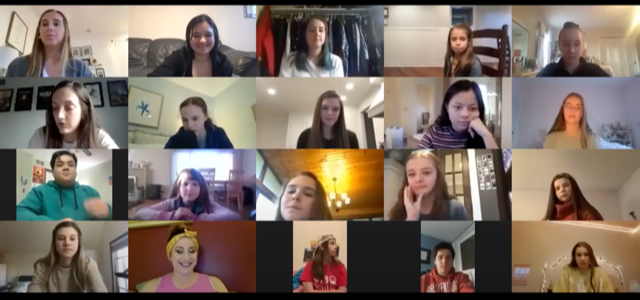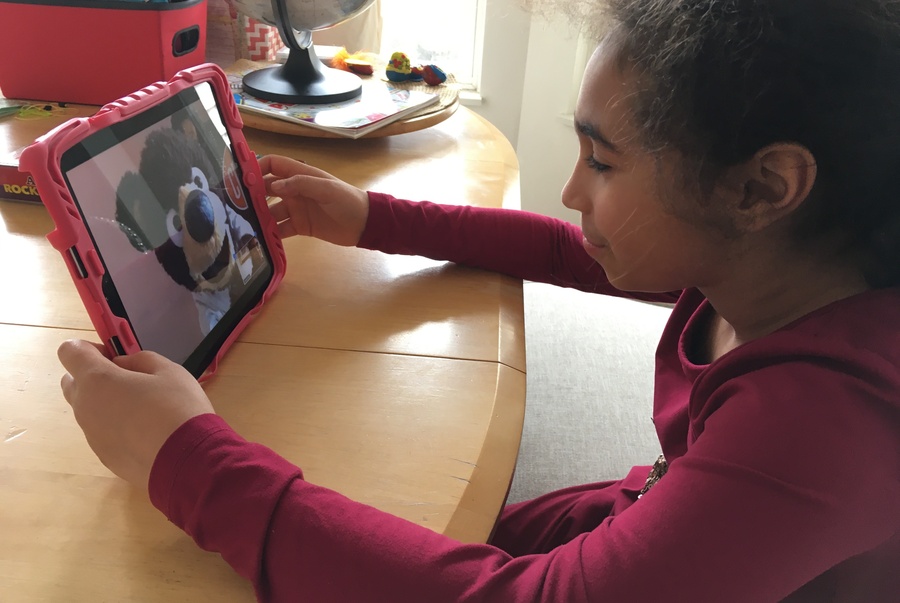“Remember, everyone: Times are tough, but so are we.”
With that simple phrase, Zeebo the Bear offers hope to his grade-school audience as he closes out another online session of Zeebo Time Live! This is the talking bear puppet’s new way of connecting with kids in the Compassionate Arts Remaking Education (CARE) program at Cleveland Play House.
As stages across the country have gone dark as part of the coronavirus pandemic shutdown, youth theatre programs have quickly adapted to online learning as well. From Zeebo-led classes in Cleveland to “Zoomsical Extravaganzas” in Chicago to theatre-based TV shows in Honolulu, virtual learning is providing theatres with new methods to serve their communities and introduce new audiences to their programming.
Many students find solace and identity in theatre education programs. For CARE artistic director Thomas Kazmierczak, making the transition online was a no-brainer.
“We really wanted the program to continue because we care,” said Kazmierczak, who is also the Zeebo puppeteer. “We still wanted our scholars, their families, and the communities we serve to be able to have the services we provide.”
With the uprooting of their regular routines, he said, students were feeling lost and unsettled, so providing familiarity and comfort was crucial. After stay-at-home guidelines were officially put in place, the CARE team sprang into action, adapting their curriculum to fit an online platform.
CARE is one of the Play House’s theatre education programs, which focuses on youth empowerment and the development of social and emotional skills through the use of theatre techniques and exercises. Offered through 19 area schools, it’s part of an initiative with multiple community partners, including United Way of Greater Cleveland and Say Yes to Education, and was created to dismantle systemic barriers that limit students’ access to theatre programs. For some kids, it’s their only exposure to theatre.
Indeed, though all Play House productions, workshops, and classes have halted, its education program is in full swing, with a lineup of classes and activities to keep kids busy throughout the entire week and answer any questions they may have. Joining CARE’s usual lineup are Zeebo Time Live!, as well as guest speakers. Through Zeebo, Kazmierczak said, he is able to reach a higher level of trust and connection with his students.
“I’ve been given the gift that this puppet can transcend the empathy and bring the focus to what really matters now,” he said. “It’s the basic questions, the basic needs that we’re taking care of.”
Guest speakers, made possible through a partnership with Northeast Ohio Medical University, feature doctors and medical students who talk to kids about the pandemic. There’s a fitness class a few days a week and a cooking class on Fridays. To continue practicing theatre, and to maintain each student’s success in English-language arts—which is core to CARE’s mission—improv and creative writing classes are held on Mondays. There’s even a virtual drama club.
Going remote did not come without its challenges. For CARE, accessibility was a big one. “Internet access isn’t freely available to Cleveland because of redlining and all sorts of other things—systematic racism, classism that exists,” said Pamela DiPasquale, director of education and artistic strategy.
With 42 percent of children in the Cleveland Metropolitan School District (CMSD) living below the poverty line, making sure every student in the program could attend virtual classes was a top priority. The team made sure to choose a platform that could be accessed in multiple ways. Zoom lets users connect to meetings through videos and phone calls, allowing anyone with internet or telephone services to use it.
Of course, interactive classes aren’t the same over the phone. And although Spectrum is offering free internet to families with grade-school students, not everyone is equipped with the right tools to access the internet. To offset this additional cost, the CMSD gave routers and computers to local families. A few CARE coordinators assisted and saw 45 families walk away with devices to connect to the internet.
“What this has forced the city and the school district to do,” DiPasquale said, “is acknowledge this was a problem and work countywide to make sure that those neighborhoods in Cleveland that were redlined out of internet access now have hotspots for those kids to use.”

At BAMtheatre in Hinsdale, Ill., the educational theatre’s leadership quickly came up with an online curriculum to keep their acting students connected while still honing their skills.
“When the world gets so shaken up, people crave something that’s familiar and something that they’re passionate about,” said BAMtheatre artistic director and founder Melanie Lamoureux, who assembled the curriculum with her managing director, Jena Sugai. “BAM has been a second home for most of these students. We knew we needed to do something.”
BAMtheatre provides professional musical theatre training and education to children from kindergarten to high school. March 13 was the scheduled opening date for their spring production of The Sound of Music. It was also the first day of official stay-at-home orders. The cast was able to give one performance that night, to an audience limited to two guests per performer. BAMtheatre’s after-school enrichment program, through which 13 schools rehearse a condensed version of a play over a 12-week period, wasn’t so lucky: Their time was cut in half this year.

Students weren’t left by the wayside, however. Lamoureux and Sugai transitioned the enrichment programs online so students could continue classes. The new remote learning program, BAM @ a Distance, consists of educational classes that allow students to engage with one another and continue participating in BAMtheatre’s programs. Mondays are “Broadway Spotlight,” where industry professionals like Natalie Weiss and Jessie Fisher host master classes and Q&As. Tuesdays and Wednesdays are book club, where students read through and discuss scripts. This year marks BAMtheatre’s 20th anniversary, and to celebrate the company livestreams an archived performance every Thursday on YouTube, accompanied by a live chat.
Finally, to give the students a chance to perform, BAMtheatre is putting on a “Zoomsical Extravaganza.” Kindergarten through eighth-grade students will rehearse a condensed version of the musical 13, with music and lyrics by Jason Robert Brown, over Zoom. The final project will be recorded and edited into a production that will be streamed at the conclusion of the season. This replaces the final performance of BAMtheatre’s enrichment programs.
“Having the weekly classes that we’ve initiated through BAM at a Distance has given us the chance to connect with our students,” Lamoureux said, “especially the ones that really love BAM and continue to participate in our programs.”
Attendance to each class can be purchased individually or through member tokens. Member tokens are $10 each, and each class requires a certain amount of tokens.
BAMtheatre also raised over $1,000 to donate to the Chicago Artist Relief Fund through a virtual choir project. Nearly 100 people from the BAMtheatre community got together to rehearse and perform “Any Dream Will Do” from Andrew Lloyd Webber’s Joseph and the Amazing Technicolor Dreamcoat, which had been set to premiere at BAMtheatre this summer.

When stay-at-home orders went into effect in Hawaii, the team at Honolulu Theatre for Youth (HTY) was well prepared to shift to a new medium. But for them, the new medium wasn’t limited to the internet.
When HTY artistic director Eric Johnson and his team of creators started brainstorming ways to continue serving their community during a pandemic, they were unaware of how much time they would have before Hawaii ordered them to stay at home. There had been talks, but an official date wasn’t set in place. By the time the theatre had to close its doors on March 23, the team had already come up with a solution: HTY set about creating an eight-episode miniseries geared toward elementary-aged students and consisting of 26-minute episodes that air on Hawaii News Now TV stations and the company’s YouTube channel.
“We have built a whole infrastructure on one-month trial memberships,” Johnson said. “It’s been scrappy.”

Scrappy? Maybe. Successful? Without a doubt. By the time stay-at-home orders officially went into effect, HTY had already shot and edited its first episode. The creative team spent the weekend recording it while they still had access to the theatre. When Monday rolled around, they were divvying up costumes and props and preparing to record their second show.
The HI Way was created with an eye toward the diverse communities HTY serves. For each episode, the actors on the HTY team, with the help of their puppet pals, recreate moments students may experience during the pandemic, but in ways that are funny, relatable, and appropriate for the entire family, while still delivering educational and encouraging messages. For example, Episode 4, “We’re All in This Together,” touches on using Zoom for the first time, experiencing “unmute” computers, and people not wearing pants. Episode 3, “Fear,” is about finding reassurance in a frightening time.
Scenes are individually directed and edited by each actor, then packaged by the NMG Network. Episodes also include home videos with uplifting messages in different languages from people all around the world, in hopes of bringing everyone together and keep them connected.
“We work really hard to make sure all kids get to our theatre—finding funding, finding buses,” Johnson said. “So it makes sense that we’re gonna try to find a way to get to all those kids and families.”
HTY’s theatre education programs are designed to make a difference in the lives of young people, from kindergarten to 12th grade. Before the pandemic, they were in rehearsals for the final production of the season, Ke Kula Keiki Ali’i (The Royal School). Now this group of theatre professionals has become a full-fledged television production company, with actors serving as directors, writers, and editors, while designers are preparing and delivering costumes to actors’ homes.
“We sent people home with a bundle of stuff,” Johnson said. “And we’ve been creating a half-hour TV show from our homes ever since.”
The pandemic has lessons for us all, it seems.
Gracyn Doctor is a Goldring Arts Journalism graduate student at Syracuse University.


